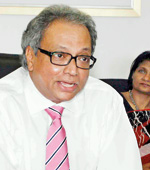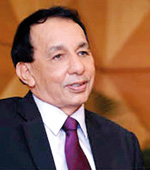Sunday Times 2
An impotent country
View(s):It is Mahatma Gandhi who was credited with the saying “To the poor man, even God appears in the form of bread”.
I was reminded of the Mahatma’s observation during the recent power cuts that we have been experiencing in our country.
 In the 21st century, it is not just bread (or rice or roti or chapatis) that the citizens of today’s societies expect to have available at affordable prices. They also expect the government in office to ensure that they have security, electricity and water. Electricity is essential for all of us these days because without power, offices and officers cannot function, factories and computers do not work – and even bread cannot be baked!
In the 21st century, it is not just bread (or rice or roti or chapatis) that the citizens of today’s societies expect to have available at affordable prices. They also expect the government in office to ensure that they have security, electricity and water. Electricity is essential for all of us these days because without power, offices and officers cannot function, factories and computers do not work – and even bread cannot be baked!
In today’s society, the facility of having electric power delivered to our homes, offices and workplaces is something we take for granted, because it is an essential service – as essential as the food we need each day. When we put a light switch on, we expect the light to come on. When we open the tap, we expect water to flow. The ancient Christian prayer “Give us this day our daily bread” in today’s context would be better expressed as “Give us this day our daily electricity and water”!
Getting rid of corrupt leaders in our country is an achievement of which we should all be proud and grateful. The new government taking it upon itself to establish good governance and reconciliation is excellent in principle – and these are certainly principles that we expect any government to follow – but the people cannot eat principles and they cannot run their workplaces on reconciliation and yahapalanaya alone.
 In fact the people of this country are not really concerned whether the national airline is in the hands of the former President’s brother-in-law or the current Prime Minister’s bosom pal. As is well known, neither Nishantha Wickramasinghe nor Ajith Dias had any real knowledge or experience of aviation at the time each of them was appointed as Chairman of SriLankan Airlines. As long as the war was won and the city of Colombo was well maintained and clean, we Sri Lankans did not really mind that the former President had appointed his brother to the job of Defence Secretary – just as we don’t really care if Arjuna Ranatunga appoints his brother to the top job in the port as long as the port functions effectively and efficiently. Our citizens will even turn a blind eye to politicians helping themselves to a few perks of the job now and then – as long as the people themselves can be confident that they will be entitled to food and water at affordable prices, and electricity in their homes and offices and factories when they switch on the current.
In fact the people of this country are not really concerned whether the national airline is in the hands of the former President’s brother-in-law or the current Prime Minister’s bosom pal. As is well known, neither Nishantha Wickramasinghe nor Ajith Dias had any real knowledge or experience of aviation at the time each of them was appointed as Chairman of SriLankan Airlines. As long as the war was won and the city of Colombo was well maintained and clean, we Sri Lankans did not really mind that the former President had appointed his brother to the job of Defence Secretary – just as we don’t really care if Arjuna Ranatunga appoints his brother to the top job in the port as long as the port functions effectively and efficiently. Our citizens will even turn a blind eye to politicians helping themselves to a few perks of the job now and then – as long as the people themselves can be confident that they will be entitled to food and water at affordable prices, and electricity in their homes and offices and factories when they switch on the current.
Our last President prioritised (at least until 2009) the ending of the war and the establishment of peace and security in this country. The people were grateful to him, at that time, for ending the war – a genuine achievement that history will record as his lasting legacy.
Since he was deposed, however, those who deposed him and are now in office have prioritised not the improvement of the lot of our citizens but the consolidation of their own political power and the placation of the big western powers. They have been misleading us citizens with their “kiyanakota ehemai, karanakota mehemai’ illusion of good governance. As Citizen Silva I speak not just for myself but for Silva and Selva, for Suleyman and Solomonsz – all of us Sri Lankans who are regretfully veering towards the feeling that this present lot of politicians are not much better than the past lot. These legislators can’t agree on many things in parliament – but while we ordinary citizens have no current, they have just got together, overlooked their differences and voted themselves larger salaries and greater perks.
“I say, Silva” said one of my friends, the day after the last power breakdown, “do you know that Sri Lanka is not an important country but an impotent country?”
I waited for him to elaborate.
“If you look up the meaning of the word impotent in the dictionary” he continued “it means ‘lacking power’. So with all this talk of reconciliation and good governance, the stark truth is that our country is, in the strictest sense of the word, impotent – because we are powerless, not having power and electricity when we need them!”

